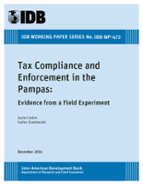Tax Compliance and Enforcement in the Pampas: Evidence from a Field Experiment
Date
Dec 2013
Journal version
Summary
Tax evasion is a pervasive problem in many countries. In particular, some developing countries do not collect even half of what they would if taxpayers complied with the written letter of the law. The academic literature has not been oblivious to the need to explain why people pay (or do not pay) taxes. However, the empirical literature has not yet reached consensus. This paper reports the results of a large field experiment that tried to affect compliance by influencing property tax taxpayers' beliefs regarding the levels of enforcement, equity, and fairness of the tax system in a municipality in Argentina. Results indicate that the most effective message was one that stated the actual fines and potential legal consequences taxpayers may face in the case of noncompliance (tax compliance increased by more than 4 percentage points). No average effects are found for the treatments designed to affect beliefs about the equity and fairness of the system. However, the evidence also points out that not every taxpayer updates his or her beliefs in the same direction, as relevant heterogeneous effects are found across the population. The evidence in this paper advances the state of knowledge and may help to reconcile some of the different results in the literature.




